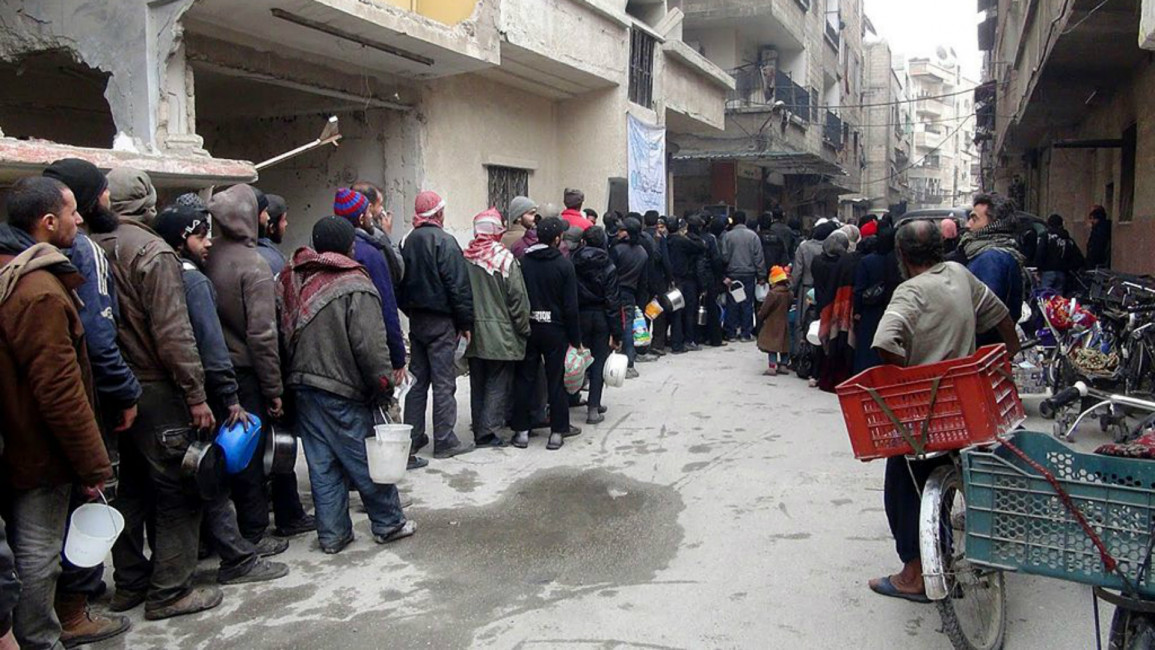
Should the US strike Assad now?
The point when something needed to be done "immediately" about Syria has passed. In fact, it was about five years ago.
In year number five, the unacceptable is accepted on a daily basis. Hospitals are targeted again and again, even in areas known to have no armed rebels. Areas cut off from food are starving. Just last month, regime soldiers controlling the checkpoints leading out of Damascus stuck guns in the faces of humanitarian workers trying pass through to deliver food, then bombed the people waiting for it on the other side in Darayya.
Neutrality in such a polarised conflict doesn't exist; even the United Nations' impartiality is seriously called into question. Reports alleging the use of chemical weapons and other banned munitions by Russian and Syrian air forces, while unconfirmed, barely raise eyebrows anymore. After all, if Assad got away with it in 2013, what’s stopping him now?
Negotiations have accomplished nothing, because the regime has no incentive to cede any ground while it has the battlefield advantage. Efforts toward a lasting ceasefire have been arrogantly disregarded time and again with few repercussions. The bloodbath continues, as the death toll in Syria passes 400,000.
The United States' position on Syria has remained largely the same since the start of the conflict: Condemning atrocities committed by Bashar al-Assad's regime, but taking little or no action to stop them. No UN resolution, press conference, newspaper editorial or protest has had any effect.
The fever pitch has reached as far as the ranks of US diplomats and State Department staff, who made a bold and unprecedented step this month by releasing a private memo meant for the State Department's private internal "dissent channel", voicing frustration with what one former envoy to Syria called a "morally vacuous and politically bankrupt" policy by the Obama administration. "No doubt they feel the moral strain of faithfully executing legal directives in support of a policy that cruelly and gratuitously leaves innocent civilians at the mercy of a mass murderer", said Atlantic Council director Frederic C. Hof.
 |
While it's unlikely the leaked cable will cause an immediate shift in policy on Syria, it does open a new field of insight into the murky internal machinations of the US State Department |  |
The memo is far from a warmongering call to lunge into battle. It states as its goals:
"To end the daily mass killing of civilians and egregious violations of human rights, cajole the warring parties to make necessary compromises at the negotiating table, bolster moderate rebel groups' role in defeating Da'esh, and help bring an end to the broader instability the conflict generates."
While it's unlikely the leaked cable will cause an immediate shift in policy on Syria, it does open a new field of insight into the murky internal machinations of the US State Department. It's an election year, which means Syrians may be stuck waiting until the next President is in office. With little to gain, the unnamed officials could possibly be seen as insubordinate, a former insider guesses in Foreign Policy.
But it's also possible that registering their grievances to the outgoing administration could be an effort to put Syria on the agenda for the 2016 election, and to signal where they stand to the future president. Former Ambassador to Syria Robert Ford praised the letter's signatories, and even the US' chief Syria negotiator and Secretary of State John Kerry is said to share their sympathies.
Among the public, Liberals are split over the issue. The generation that elected Obama doesn't want another Iraq - but Syria is not Iraq. Nothing like the unabated slaughter today in Syria existed for five years prior to the United States' invasion to depose Saddam Hussein, justified under false pretenses. Neoconservatives rallying behind Donald Trump are skeptical of any American commitments abroad, and the Democratic Party is embroiled in an existential divide over its progressive values.
When it comes to Syria, more young and progressive-minded supporters of democratic candidate Bernie Sanders oppose the United States asserting a dominant role in foreign affairs, while Hillary Clinton's supporters favour American power stepping in to solve the world's problems.
Ali Gharib writes in The Nation (which endorsed Sanders in January) that addressing the humanitarian situation must be balanced against the potential ramifications of mission creep, or slipping into increasingly greater commitments in fixing Syria's problems.
 |
After weeks of intense public debate President Obama eventually decided against taking action in retaliation, hoping that reconciliation would help stem the tide of the conflict |  |
This argument misses the point, and is woefully outdated. What possible outcome is so horrible that avoiding it justifies all the bloodshed today? From the same logic follows the moral danger that inertia creeps as well – the longer the slaughter continues and we do nothing, the more we become complacent about the escalating violence, and slip backwards in time.
This debate was hashed out back in 2013, when the Syrian government carried out a chemical weapons attack that killed over a thousand people in a single day. After weeks of intense public debate President Obama eventually decided against taking action in retaliation, hoping that reconciliation would help stem the tide of the conflict, which has continued for three years with no end in sight. Syrians don't have the luxury of such theoretical discussions.
Anti-interventionists (who sometimes dabble in elegies for Assad) often employ a cynical doublespeak which posits that the responsibility to protect – a recognised tenet of international humanitarian law - is a front for self-serving aims, and that a UN resolution to impose a no-fly zone would be tantamount to an act of war.
Senator Bernie Sanders has argued against a no-fly zone on the basis that it would be too "expensive", and that it would inevitably pull the US deeper into the conflict.
These assertions overlook the primary intention: To spare civilians from the aerial bombardment which has claimed the majority of lives lost in the conflict. Things would only escalate if Assad chose to violate the no-fly zone to continue the bombing, which currently, it doesn't even bother to claim it does, to order to target terrorists planning imminent attacks.
It's no surprise, then, that Russia has obstinately opposed a no-fly zone at the UN Security Council several times, since it would open a legal justification to shoot down bombers to enforce the United Nations mandate.
 |
The least destructive path of moral decency would be to enforce the imperative to deliver food to besieged cities where Syrians are starving |  |
Not even the most hawkish politicians in Washington today advocate for the removal of Assad by force. (Even John McCain acknowledges that a rerun of the power vacuum left by deposing Saddam Hussein was a huge mistake that cost more than they bargained for.
To devote so much thought to the possibilities of what might happen if the US gets too involved in Syria detracts from considering what has happened as we have stood by wringing our hands.
This is not a call for bombs over Damascus. Nobody thinks that adding more foreign military intervention to the mix is going to solve problems or make things less complicated. But for all the ruminating on the side effects, the main effect is too often overlooked - ending (or at least slowing) the relentless murder of urban civilians defenseless to aerial bombardment.
The question of whether foreign powers should stand on the sidelines or act is one of black-and-white, good vs evil - it's an ethical question of whether the benefits outweigh the costs of doing nothing.
The much more pertinent ethical question is why does the deliberate bombing of a hospital go unpunished, but the suggestion of attacking Assad draws a placating response? Just what sort of ramifications should such a regime suffer from the international community? If Assad has suffered no consequences whatsoever for the deaths of over 400,000 Syrians, what's stopping him from keeping his promise to burn down "every inch of the country"?
 |
Nicholas Hénin stresses that the protection of civilians must be put first as both the means and the end of any course of action aimed at a solution in Syria |  |
With all the hand-wringing over how many moderate rebels in Syria are worth backing, there should be no debate about whether to back civilians who have not taken up arms and are defenseless against daily air strikes which have leveled once-prosperous cities.
What could that action look like? Danny Postel has offered that the least destructive path of moral decency would be to enforce the imperative to deliver food to besieged cities where Syrians are starving. If a United Nations convoy drove through a Syrian regime checkpoint guarded by blue-helmeted peacekeeping troops and were shot at, could anyone question the legitimacy of the use of force?
French journalist Nicholas Hénin stresses that the protection of civilians must be put first as both the means and the end of any course of action aimed at a solution in Syria. "If a Syrian Air Force helicopter were downed by a Western fighter jet immediately after bombing a civilian area, would the message not be powerful enough to deter the regime from pursuing its war crimes?"
Ask any Syrian if they expect the world to come to their aid, and the response will be that all hope was lost after 2013. To be bitter at America for leaving Syrians to suffer at the mercy of a dictator with an unlimited arsenal of Russian weaponry doesn't take a crazed extremist. The calculation may have been made at that time not to intervene in Syria - but time is running out for the Obama administration to show that it has a moral bone in its anemic policy on Syria.
This time, it should factor in the lives of the thousands of innocent civilians, journalists and children who - if they survive - will become a generation that will resent a world that abandoned them.
Follow him on Twitter: @shawncarrie
Opinions expressed in this article remain those of the author and do not necessarily represent those of The New Arab, its editorial board or staff.




